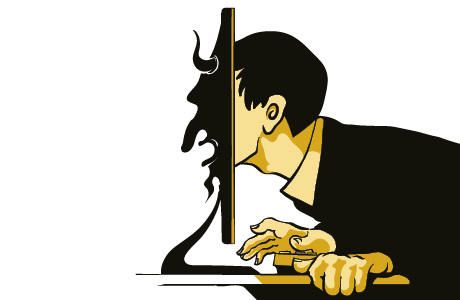
Joining a fan group (fandom) on the Internet can be a fun experience. You discuss the book, show, or movie you love with other passionate fans and you can create fan ideas and discuss characters you love or hate.
What happens when you disagree with someone or when the writers and showrunners make a decision the fandom didn’t want? This is where the all-too-common toxicity comes from. When such fandoms take place on the Internet, people say things they probably wouldn’t say in person, which means that discussing hot topics in a fandom is not for the faint of heart. If you say anything controversial or even something as simple as “I don’t like that character,” people will call you dumb, tell you to never go on the Internet again, or even—horribly—tell you to kill yourself.
Fandoms aren’t the only place online infected by internet toxicity—sadly, you can say anything on the Internet and get eaten alive. But the fact that this kind of toxicity exists within groups that supposedly share a love of the same show is horrendous. Disagreements will happen but people shouldn’t feel like they have to leave a fandom because they don’t ship a couple or don’t like a character.
Another huge part of most fandoms is ship culture, in which people fall in love with a relationship and loudly express their love for the relationship, whether it already exists in the show/book or not. People make edits of their favorite ships and if there are multiple ships for one character and the fandom goes to war over the different ships, those in the fandom will feel forced to choose a side. If you dare to like both ships, both sides of the fandom will attack you, call you names, and generally hate you. This is a toxic environment that serves a purpose, for having a ship war can increase viewership and media coverage but it also incites a disjointed feeling within the fandom and increases the likelihood of toxicity.
Sometimes people ship a couple that isn’t together and it takes over the fandom. This is especially complicated when the writers didn’t expect people to ship this particular couple and even had other plans for the characters. Writers then have to make a choice between putting the two characters together for fan service or continuing with the original plan and risk losing fans. Honestly, I don’t know the right answer. Of course, writers should put good writing over fan service, but when writing a TV show, for example, sometimes actors have unforeseen chemistry. Adding a relationship can work with the story and add something beautiful but can also disrupt the plot. Sometimes writers proceed with the fans’ wishes so that they don’t risk losing fans and risk a ratings drop. This is usually a bad idea long term as it can ruin the storyline of the character and make the overall writing decline which in turn can ruin the likelihood of people rewatching.
There is also a huge problem with fans who love a ship on a show and then want the actors to get together in real life. Even when the actors say that they don’t want to date each other or are already with someone else, fans will make ship edits of the actors, comment on their social media, and attack their significant others online. This must make the actors so uncomfortable, plus it creates a disconnect between the actors and the fandom. It really needs to stop, since it is none of the fandom’s business who our favorite actor is dating, what their sexuality is, or what they do in their free time. Kit Conner, who plays Nick Nelson on Heartstopper, recently made this statement on Twitter after rumors about his sexuality circled the internet: “I’m bi. Congrats for forcing an 18-year-old to out himself. I think some of you missed the point of the show. Bye.” Actors are people too and deserve privacy and respect.
On the other end of the spectrum, there are also fans who don’t like a ship, a character, or an actor and so will send the actor death threats and/or attack them on social media. Josh McDermitt from The Walking Dead revealed that after his character made some bad decisions, his Twitter was flooded with death threats so bad that he deleted his social networks. This sort of hate can be so bad that actors have left shows over the hate that the show’s own fans throw at the actors, often people who have no control at all over whatever writing the fan happens to hate. There needs to be a much better understanding of the line between critiquing a show and brutally attacking a show/actor.
Fandoms can be a fun welcoming place but things can quickly turn sour. We all need to make a conscious effort to remember that actors and people on the Internet are real people with real emotions who have a right to their own opinions. Internet hate will most likely never stop but we can try to avoid blatantly threatening people and making fandoms unwelcoming, miserable places.
Artwork by Alexander Pavlov
